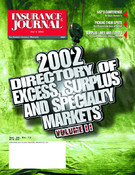Insureds and cedants have sued their insurance agents, insurance brokers, reinsurance intermediaries or reinsurance brokers when their insurance carrier or reinsurer faced financial difficulty and could not respond to a meritorious claim. From my perspective, the various legal precedents and court decisions have indicated that the responsibility of the agent or reinsurance broker has been limited to a verification that at the time the policy or treaty was issued the insurer had an acceptable rating assigned by a credible rating service.
I am contrasting this well-established precedent with regard to duty with some of the situations that I have encountered over the past few months. Lately I have had to advise insureds, their agents or potential insureds that the rating information that their agent, reinsurance broker or even their insurance company had provided to them was not the latest available rating. It was not an accurate rating as of the effective date of their policy. In one situation, the rating information that the insurance company provided to their insured was three and one-half years old!
It seems to me that the legal standard for insurance agents and reinsurance brokers is clear. Their duty is to verify that the insurer or reinsurer had an acceptable rating at the time of policy issuance or the date of the treaty, as the case may be. It now appears that agents and reinsurance brokers must be on guard against the insurance carrier that he or she seeks to place business with. Blind acceptance of out-dated financial information or blind acceptance of out-dated ratings is not sufficient to meet the standard of care required to avoid professional liability.
Insurance company ratings are revised at least annually. Demotech Inc. monitors its ratings on a quarterly basis. Other rating services publish ratings on a monthly, weekly or daily basis. If an insurance company presents you with a rating that is more than one year old, you must be cautious. If a rating is more than one year old, it is of no more value than last period’s insurance policy would be to cover a loss during the current period.
The analogy between an annual rating cycle and an annual insurance policy works for me. Let’s continue the analogy, at the time an application is taken, certain information is assumed to be accurate. For an automobile insurance policy, the premium is quoted based upon the driver’s assertions that his or her driving record is clean and that the driving distance to work is as presented. However, if the information that was presented by the insured is inaccurate, the policy will be endorsed to reflect the underlying driving record of the insured and the actual driving distance to work. Suddenly that classification 811110 becomes 811813.
Applying the analogy to ratings, at the time that a rating is issued, certain financial facts are deemed accurate and relevant. Over time the accuracy of the facts is subjected to verification. For example, quarterly financial statements reflect a run-off of the year-end loss and loss adjustment expense reserves. Over time, if assumptions and information are verified, the initial rating remains at the level at which it was assigned. However, if assumptions prove to be optimistic or invalid or if circumstances change for the worse, ratings are revised downward.
When an agent asks an applicant about their driving record, the agent would not accept a motor vehicle report that was three years old. When you ask an applicant how much they make, you expect them to tell you about last year’s income and today’s earnings, not what they earned three years ago. When you ask them how many miles they drive to the office, you mean now, not a year ago, when they may have lived somewhere else.
You need timely accurate information so that you can prepare a quotation and proposal that is based upon pertinent information. Similarly you need the latest insurance company rating information when you perform your due diligence as regards the solvency of your insurance markets. Do not allow an unscrupulous individual looking to cut a corner to put you in harm’s way of a lawsuit.
The standard of care for an insurance agent or a reinsurance broker is fairly well defined and relatively easy to meet. Get on the Web and verify the rating. In the dynamic ratings environment that we are in, year-old information may well be ancient history.
Joseph Petrelli is the president and founder of Demotech Inc. Since 1985 Demotech Inc. has been a financial analysis and actuarial services firm serving the needs of the property and casualty insurance industry. Demotech Inc. was the first company to have its rating process formally reviewed and accepted by Fannie Mae, Freddie Mac and HUD.
Topics Carriers Agencies Reinsurance
Was this article valuable?
Here are more articles you may enjoy.


 Insurify Starts App With ChatGPT to Allow Consumers to Shop for Insurance
Insurify Starts App With ChatGPT to Allow Consumers to Shop for Insurance  Trump Demands $1 Billion From Harvard as Prolonged Standoff Appears to Deepen
Trump Demands $1 Billion From Harvard as Prolonged Standoff Appears to Deepen  Pipeline Explodes at Delfin LNG Planned Project in Louisiana
Pipeline Explodes at Delfin LNG Planned Project in Louisiana  Uber Jury Awards $8.5 Million Damages in Sexual Assault Case
Uber Jury Awards $8.5 Million Damages in Sexual Assault Case 



